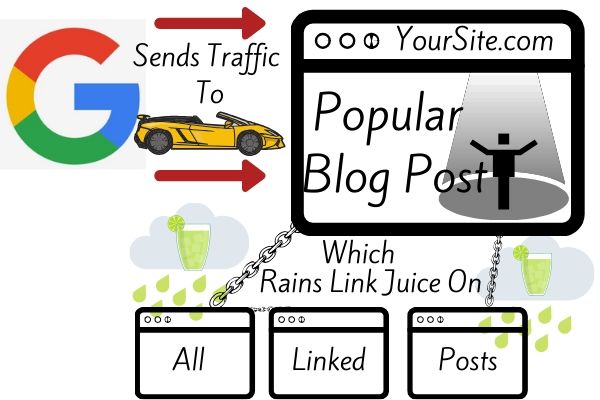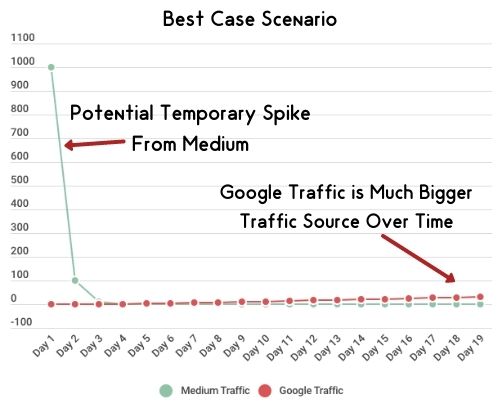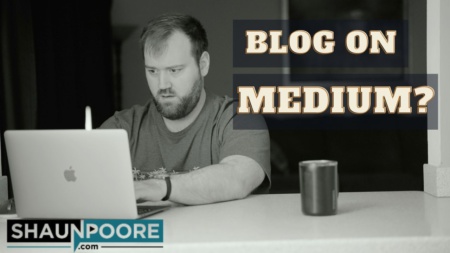When you first start blogging, nobody will visit your website, and you’ll be desperate for traffic. You’ll inevitably discover Medium.com, think it looks like a decent source of traffic, and then want to try it out.
But you shouldn’t, and here’s why.
Your Medium Post Will Out-Rank Your Website
I found several instances of authors complaining that their Medium post outranked their actual website. I observed this same phenomenon myself as I was doing research for this article. Many authors were confused about this because Medium allows you to set the canonical tag to point back to your website.
But that’s not how a canonical tag works. In fact, here’s a video of two Google engineers literally laughing at the idea that you can use a canonical tag in place of a 301 re-direct and calling it a myth.
In the video above, they make a couple of interesting points.
- A canonical tag isn’t a directive; it’s a signal. Google can choose any URL it wants as the primary URL of the content.
- The content needs to be a near duplicate for canonicalization to work correctly.
Medium will end up outranking your website in most scenarios. This is awful news, and here’s why.
Your Medium Articles Will Decimate Your Domain’s External and Internal Link Value
The most effective way to build backlinks is by Bloggers finding your site through Google and linking to you. How exactly are they going to do that if they find your article on Medium?
They can’t. Worse, internal links from popular blog posts on your domain spread link juice throughout your website. This raises the rank of all of the articles on your domain. However, all Medium links back to your domain are no-followed. Meaning they pass no value back to your domain.

Why exactly did you just voluntarily destroy the value of your domain? How much is Medium paying you for this?
How Much Does Medium Pay Per 1,000 Page Views?
Bloggers are making $15 to $35 per 1,000 page views on Medium.
Which honestly isn’t bad. You’ll make similar amounts from ads on your website. But, there’s no financial advantage to Medium either. At best, it’s a draw in terms of monetization. And that’s assuming you plan to monetize exclusively with ads.
The Medium Partner Program says that earnings are calculated based on member read time. (Pre-November 2019, engagement was part of the earnings equation. No longer the case.).
“Partner Program writers are paid every month based on how members engage with their stories. This is determined by member reading time. Each member’s subscription fee is distributed proportionally to the stories that the individual member engaged with that month. ”
-Medium Website
Obviously, this makes it impossible to give a definitive RPM (revenue per 1,000 page views). A pageview doesn’t indicate how long a member will read an article or how many other articles they read that month.
Medium doesn’t publish official stats. Meaning the best I could do was search the web for anecdotal evidence. Here’s how much various Medium authors claimed to be making on the platform per 1,000 pageviews.
- In this Reddit post, the OP had a $16 RPM, and a commenter had a $35 RPM.
- This blog post about how much the author makes per 1,000 pageviews on Medium cites the $15 to $35 number.
- This blogger earned $6,250 from a million views, a $6.25 RPM.
Will Medium Actively Drive Traffic To Your Articles?
In a best case scenario, Medium’s curators will notice your article and want to feature it somewhere on the website. This isn’t likely to happen on a per article basis. However, if you write enough articles, you’ll hopefully see it happen once or twice. Giving you a surge that looks like this.

The numbers above are made up. However, I tried to make them up based on reports I saw on Reddit of users who were curated on Medium. Regardless, the point is that the traffic spike from Medium is
- Unlikely
- Temporary
- Not enough traffic to earn significant revenue.
- Small compared to Google traffic the article will receive over time.
Having a Custom Domain on Medium
In August of 2020, Ev Williams announced that Medium would begin accepting custom domains with its service again. You can see examples of this in action here, here, and here. These sites clearly use Medium as a backend with their own domain name in the URL.
If you’re going to write on Medium, make sure you set it up to use your own domain name. However, even if you’re approved for a custom domain on Medium, it still has some problems that I’d be very concerned about.
- Internal/External links are still no-followed.
- Your articles are still behind a paywall.
- You can’t change the page layout. Meaning you have no space to sell your products or advertising.
- Ownership Concerns
Ownership Concerns
Medium’s Terms of Service has some very troubling language around who owns your content.
“Unless otherwise agreed in writing, by submitting, posting, or displaying content on or through the Services, you grant Medium a nonexclusive, royalty-free, worldwide, fully paid, and sublicensable license to use, reproduce, modify, adapt, publish, translate, create derivative works from, distribute, publicly perform and display your content and any name, username or likeness provided in connection with your content in all media formats and distribution methods now known or later developed on the Services. ”
-Medium’s TOS – September 1st, 2020
This concern has led to several creators leaving the platform. Including Hackernoon, who got pretty upset when Medium basically referred to them as a Facebook page.
The language in the TOS troubles me greatly. In recent years Business Insider and Forbes have started straight-up copying Quora posts word for word. Since Forbes has very high domain authority, they easily outrank your Quora post. And since you sold your copyright to Quora when you used their platform, you have no real recourse when Quora chooses to sell that work to another company.
I’m not saying Medium is going to sell your articles to other companies. Just that their TOS gives them the power to do so. Because of this, I’m incredibly wary of using the Medium platform. And you should be too.
Conclusion
To sum up, here’s a list of reasons why you shouldn’t blog on Medium.
- Medium will outrank your website.
- Medium won’t pay you more than you’d make on your own website.
- Medium may cannibalize your external and internal link equity. Which destroys the value of your domain.
- Medium won’t drive vast amounts of traffic on its own.
- Medium has the authority to sell and redistribute your work on other platforms without any need to get consent from you.
- Running your own blog is cheap, you’re not saving a lot of money by blogging on Medium.


